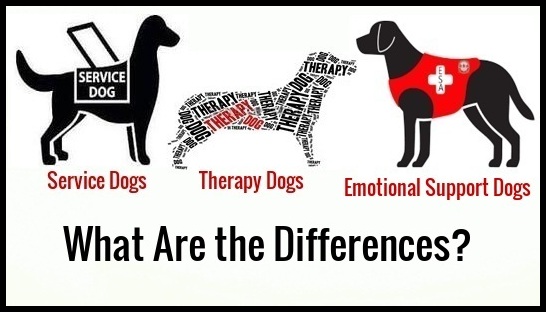Have you ever been shopping and noticed someone brought their dog inside the store with them, and wondered if that were legal, and if you could bring your own pet on your next visit? Want to rent an apartment that forbids pets, but you need your dog to help you feel calm and reassured? Are you curious to see if your Sheba has what it takes to visit sick patients at a children’s hospital? If so, read on!
The laws vary based on which country you live in, and I’m only familiar with those in the United States, so i’m going to focus on those. If you are located in a different part of the world, this will hopefully give you a good idea of where to begin your own research!
According to the Americans With Disabilities Act, Service animals are defined as “dogs that are individually trained to do work or perform tasks for people with disabilities.” These dogs are trained to do specific tasks to assist their human companions, and different dogs have different skills, although they can be cross-trained. In general, all dogs are trained to retrieve items, open and close doors and cabinets, and turning lights off and on. Medical and Alert Service Dogs pull wheelchairs and drag walkers, alert handlers and caretakers to emergency medical situations, and even call 911 or a Designated Emergency Person with a K9 Safety Phone. Brace and Mobility Support Service Dogs assist handlers with changing positions (such as going from sitting to standing), transfering from a chair to the couch, bracing when walking, and pulling the blankets over the handler. Visual Assistance and Guide Service Dogs lead handlers along familiar routes, alert handlers to specific entrances and locations of elevators and exits, and help them avoid moving objects (cars, skateboards) and hazards (open manhole covers). Hearing Service Dogs alert their handlers to specific sounds (such as a baby crying, knocking), alarms, and their name being called. Finally, Psychiatric Service Dogs provide medication reminders, provide grounding through nuzzling or licking, alert handlers to strong emotion, wake the handler up during nightmares, interrupt flashbacks, help handler realize hallucinations aren’t real, and even search the house.
According to the ADA, service animals are working animals, and not pets. Having a disability isn’t enough to have your own dog considered a Service Dog, because your dog has to be able to do the tasks that you yourself are unable to do. You may train your own Service Dog, or the dog may be trained by a friend, a family member, or a professional trainer.
While Service Dogs are not required to be registered by the ADA, there are two key laws to keep in mind:
- Service Dogs must be allowed into businesses and no one is allowed to ask about your disability, although they can ask if the dog is required for your disability and what tasks the dog is able to perform.
- It is against the law for you to pretend to be disabled. Therapy dogs are used in different facilities to comfort people and to give affection. They typically provide a calming presence in schools, hospitals, nursing homes, and disaster areas, The dogs will have different expectations based on the setting; for example, a dog brought to a school setting may be expected to sit quietly as a child reads to it, while a dog visiting a nursing home would enjoy being petted by senior citizens. Unlike Service Dogs, the Americans With Disabilities Act does consider these dogs to be pets and not Service Animals and they are not given any special rights or access. This means that you cannot take this dog into shopping centers without prior approval, and apartments are not required to rent to you. Many institutions also require these dogs to be certified and also to have liability insurance. Most hospitals will also require the dog to pass the American Kennel Club’s Canine Good Citizen Test.
Emotional Support Animals (ESAs) provide comfort, support, and a calming presence to their caretakers on a daily basis. They help reduce anxiety, assist the caretaker with overcoming trauma and provide unconditional love and companionship, This category isn’t limited to dogs and can include more exotic animals, such as pigs and peacocks!
Emotional Support Animals are required to be prescribed by a licensed mental health professional, such as a therapist, psychologist, or psychiatrist. Unlike Service Dogs, which have been trained to perform specific tasks, Emotional Support Animals are considered pets and aren’t granted access to places such as shopping centers and restaurants; however, according to the Fair Housing Act, they are permitted to live with you in non-pet-friendly housing. The Air Carrier Access Act also allows these pets to stay with you in aircraft cabins during flights.
Hopefully this article has answered some of your questions about these very helpful and much needed animals!
